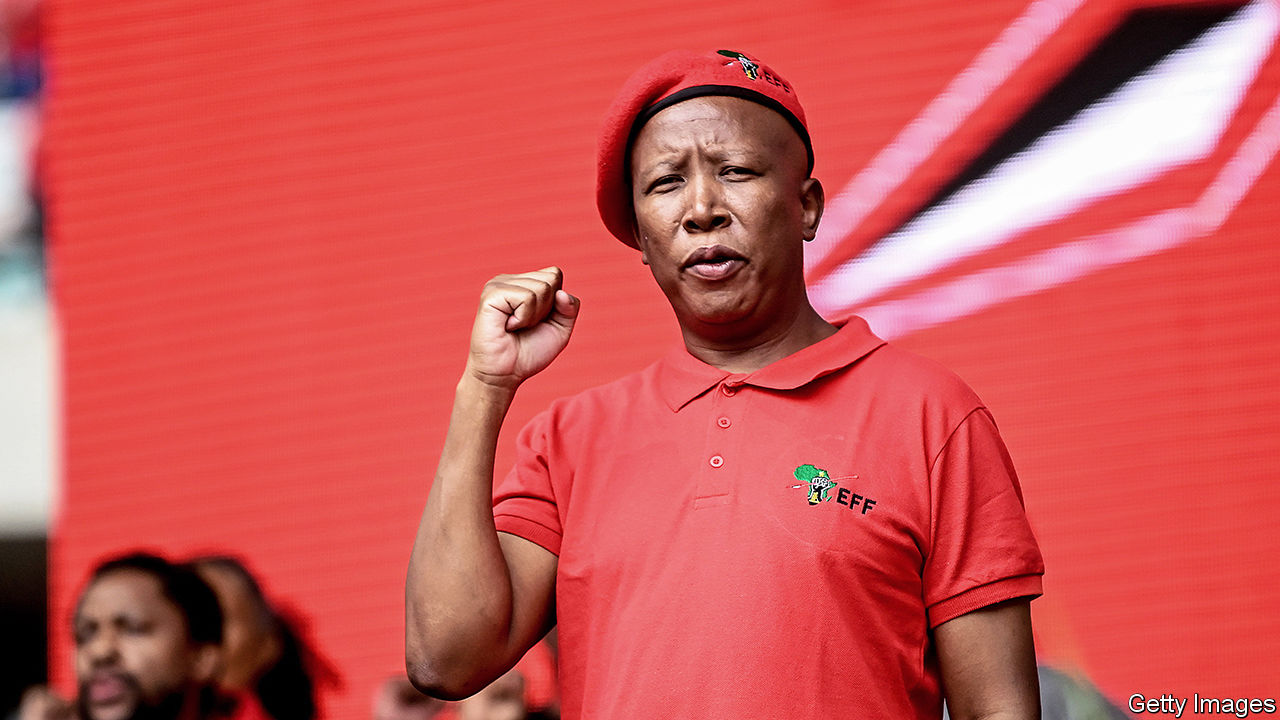
Julius Malema: the contentious EFF leader could be the election’s kingmaker in South Africa
In the event that the African National Congress (ANC) loses its majority, as early election results indicate, Julius Malema of South Africa, who left the party to found a radical leftist organization, may assume the role of kingmaker or perhaps deputy president.
Fears about the African National Congress (ANC) absorbing Malema and his Economic Freedom Fighters (EFF) to maintain control following Wednesday’s election instill anxiety in investors and the white upper-class that he decries.
They believe that the EFF’s proposals to nationalize the nation’s gold and platinum mines and take land away from white farmers will jeopardize not only their privileges but also the most advanced economy in Africa.
Malema’s commitment to addressing ongoing racial and economic injustices is well received by his supporters, which include tens of thousands of unemployed and disenfranchised Black youth in urban areas, middle-class students who are having difficulty paying for their education, and recent graduates who are having difficulty finding good jobs in a sluggish economy.
Although the African National Congress (ANC) freed Black South Africans from white minority rule thirty years ago, the broad prosperity it promised has not yet materialized. In the meantime, the wealthiest people—both White and Black—have experienced an increase in their share of the money.
A third of South Africans are unemployed, including a large number of college-educated Black voters.
“The director of South Africa’s Centre for the Study of Democracy, Steven Friedman, stated, “points out accurately that we haven’t solved the racial issue in our nation.”
However, he continued, Malema has not succeeded in making the party more appealing to people living in rural areas in abject poverty.
With its signature red shirts and berets, the EFF is reminiscent of socialist movements from the past. In municipal polls conducted in 2021, it received over 10% of the vote, while in national polls conducted in 2019.
But Malema’s wealth and way of life have drawn criticism from other politicians who mock his taste for expensive automobiles, jewelry, champagne, and houses in lush suburbs. One such property he sold, which had a movie theater and a cigar lounge, to cover $1 million in unpaid taxes.
Additionally, he has been accused of corruption, which he disputes. A judge dismissed allegations of money laundering against him in 2015, which had to do with government contracts.
“DISPLAYING DIVISION”
Numerous Black supporters of Malema wearing red shirts engaged in combat with a small group of white racists, some of whom were dressed in army uniforms from the apartheid era, during a protest in Senekal, a predominantly agricultural province of the Free State, in late 2020.
Tension was evident until one of the white counter-protesters was approached by an EFF security guard who made a conciliatory gesture. The argument was diffused when everyone turned to face each other and made soothing hand gestures.
It was typical of Malema’s ability to raise the temperature on simmering class and racial tensions in the nation without causing them to explode.
Malema, who was raised in Limpopo, north of Johannesburg, as the son of an Indian family’s domestic helper, became politically involved at an early age and became president of the ANC Youth League in 2008.
In 2011, he started his own party after being suspended from his position as youth leader by the ruling African National Congress (ANC) for “sowing division”.
Although his supporters kindly refer to him as “Juju,” which is short for Julius, Malema’s opponents like labels like “firebrand,” “militant,” “clown,” or “populist.”
Nonetheless, his party is the only one working to overturn laws that restrict Africans’ freedom of movement in a country where antipathy toward immigrants from other African nations is the primary populist grievance.
Regarding immigration, Chris Ogunmodede, an analyst and editor of World Politics Review, stated, “The EFF is swimming against the tide.” “(It) will likely lose out (on) many votes it might otherwise get.”
When Malema proposed visits to eateries in January 2022 to ensure they were not hiring an excessive number of foreign workers, he gave a fleeting hint of xenophobia, but he never pulled out the farce again.
All Categories
Recent Posts
Tags
+13162306000
zoneyetu@yahoo.com



